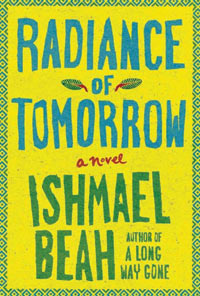Books: Ishmael Beah’s Radiance of Tomorrow
Bestselling Author Comes to UCSB to Talk About His Latest Book

Imagine returning to your remote ancestral home and finding the houses burnt out, the walls riddled with bullet holes, and the ground littered with human bones, some of which you know belonged to blood relatives, possibly those of your own children. The long war that caused this destruction may be over, but in the town of Imperi, the past is a powerful presence that infects every moment of the present.
This is the backdrop for Ishmael Beah’s novel, Radiance of Tomorrow. Though a work of fiction, the story is tethered tightly to the reality of what is happening today in African countries like the Democratic Republic of the Congo, where war, crippling corruption, and foreign competition for valuable natural resources or geopolitical advantage are facts of life.

Beah manages to describe the consequences of neo-colonialism without once mentioning the term. Beah’s characters — Bockarie and Benjamin, Pa Moiwa and Mama Kadie, the man-child Colonel and the former child soldier Ernest — are not remarkable individually, but as an ensemble, their struggle to rebuild their lives in Imperi after years of war and dislocation, after surviving the temporary permanence of refugee camps, the turpitude of the paramount chief and the local authorities, and the immorality of a foreign mining company that is untouchable and unaccountable, is a moving testament to the will of people to use whatever agency they can muster to create a better future for their children — even against staggering odds.
The strength of Beah’s writing lies in his compassion for people and places. In Radiance of Tomorrow, he has created a story of hope where hope has no right to reside.
4•1•1
An Evening with Ishmael Beah takes place Monday, March 10, at 8 p.m. at Campbell Hall. $15 general; $10 UCSB students. Info: 893-3535 or artsandlectures.sa.ucsb.edu.



